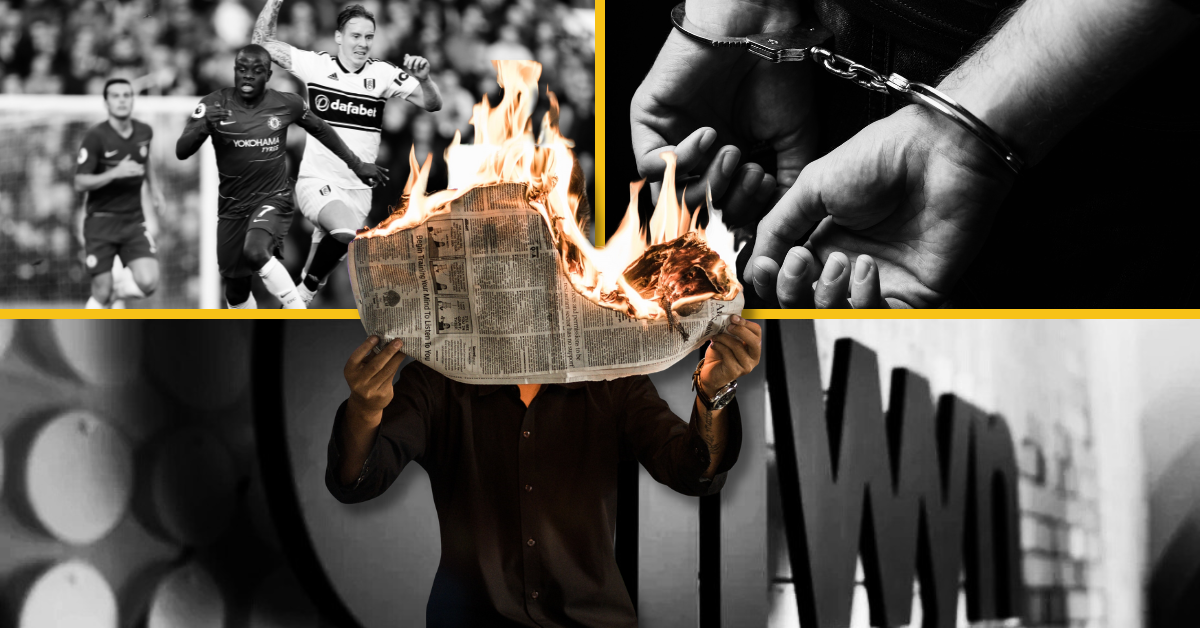
The Guardian brought us its latest coverage of the cosy relationship between sports and gambling this week, as it examined the result of upcoming changes to sponsorship rules.
With the Premier League banning front-of-shirt gambling ads from next season, clubs are supposed to be losing out big (up to 20% of commercial revenue, according to West Ham’s Karren Brady as quoted in the article).
Perhaps unsurprisingly, some teams seem determined to keep the cash flowing, just with a twist.
Sunderland, Aston Villa, Leeds, Nottingham Forest, and Chelsea have quietly leaned into “hidden” partnerships with Asian-facing operators that are unlicensed in the UK, the paper reports.
These brands, aimed at markets like China and Southeast Asia, are still splashed across stadium LED boards and sometimes tucked onto club websites, but often only visible to fans logging in from abroad.
Chelsea, for example, acknowledges 8Xbet for some viewers but hides Kaiyun for others; Villa touts Nova88 in Malaysia, but their UK-facing site barely mentions it.
The workarounds exploit the rule that the upcoming ban only covers shirt fronts. Sleeve space and stadium boards remain fair game.
Clubs are also leaning on a relaxed stance from the Gambling Commission, which now only requires that unlicensed partners don’t take bets from UK customers or in sterling.
Could this be risky? Apparently so, since the true owners of these operators remain largely unknown, and links to illegal activity in Asia have been flagged by the UN and the Asian Racing Federation.
The phenomenon is not unprecedented, however. Spanish football has been quietly doing this since banning betting ads in La Liga after 2020-21. Real Madrid, Atlético Madrid, and others keep their Asian-facing sponsors out of local fans’ view while still cashing in.
UK fans may never know who’s bankrolling their clubs from abroad, but the lesson is clear: the Premier League’s ban might change shirts, but it won’t change the money game.
Sunderland politely declined to comment on their arrangements. Aston Villa, Leeds, Nottingham Forest, and Chelsea didn’t respond.
Next, the Daily Mail brought us the story of a former political heavyweight’s son finding himself in hot water thanks to a betting-linked scheme.
The son of former Labour spin doctor Alastair Campbell is at the centre of a police investigation after a football betting fund he ran spectacularly imploded.
Rory Campbell, 37, launched the syndicate in 2017, promising to outsmart the bookies with mathematically modelled bets across Europe.
Early investors were briefly paid returns with money from newer backers (classic Ponzi-style stuff) but the scheme hit the buffers last December. Around 50 backers were left out of pocket, reportedly including Campbell’s own parents, with losses said to reach £500,000 for some.
Even former Lord Chancellor Charlie Falconer, a Blair-era flatmate, reportedly stepped in for damage control, holding meetings to “calm tempers” when backers were told their money wouldn’t be returned.
Police have now made an arrest in connection with the case, with a man from North London bailed pending further inquiries.
The probe centres on alleged fraud by false representation, with claims the venture could be worth up to £5m. Investors compiled a dossier containing bank statements, contracts, and emails promising profits, all of which has reportedly been handed to authorities.
The syndicate placed up to 80 bets a week on leagues including the Premier League, Bundesliga, Serie A, and La Liga, using models that considered injuries, player link-ups, and weather conditions.
Rory Campbell’s football fund may have aimed for glory on the pitch, but off it, the scoreboard tells a very different story.
This week, the Financial Times treated us to a profile of Allwyn CEO Karel Komárek, or as the paper described him, “the Czech gambling billionaire making a play for the US.”
Komárek has been busy off the water and on the balance sheet. Fresh from winning a regatta in Saint-Tropez aboard his 100ft superyacht, the mogul celebrated another, far more lucrative victory: Allwyn’s €16bn merger with Greek operator OPAP, creating one of the world’s largest listed gambling groups.
The enlarged company will keep its Athens listing, with a secondary one in London or New York to fuel further expansion, with the US squarely in its crosshairs.
The profile paints Komárek as intensely hands-on and highly competitive, juggling everything from lotteries in seven countries to casinos, sports betting stakes like Betano, and the recent $1.6bn PrizePicks acquisition in the US.
This is Allwyn’s push into the booming American sports betting market and potentially into prediction markets, where PrizePicks now has CFTC approval.
Komárek’s rise from selling industrial parts in post-Iron Curtain Czechoslovakia to building a €10bn-plus empire is well-known, as is his careful balancing act between Swiss luxury living and his home country commitments, from the Dvořák Prague International Music Festival to philanthropic ventures with his wife.
But the profile also flags tension points: the ongoing £1.3bn legal spat in the UK with Richard Desmond’s Northern & Shell over the National Lottery licence, residual scrutiny over past Gazprom links, and the high-stakes race to carve out US market share against entrenched rivals like FanDuel, DraftKings, and the prediction market heavyweights Kalshi and Polymarket.
Analysts say Allwyn’s latest moves are part of a long-held ambition to build a gambling behemoth capable of taking on the global giants.
Komárek himself frames it simply: the US is the market “where an entrepreneur, particularly in the fast-changing gambling industry, can really prove yourself.”
Whether he’ll win in America as he did in Saint-Tropez remains to be seen.
#SportsBetting #FootballSponsorship #GamblingRegulation #PremierLeague #HiddenSponsorships #FinancialCrime #Allwyn #Komarek #BettingIndustry #GlobalGambling #SportsIntegrity